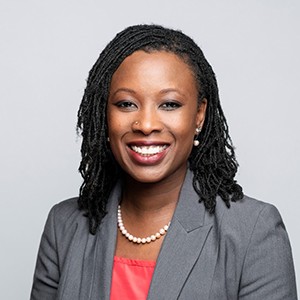
Yabome Gilpin-Jackson
We’re pleased to welcome award-winning scholar-practitioner Yabome Gilpin-Jackson to the instructional team of our Executive Leadership Certificate program. Yabome is the founder of her own consulting practice where she supports, coaches and develops leaders across a wide range of organizations and sectors.
Her extensive experience makes her the perfect choice to lead our Change Management for Leaders course.
What attracted you to teaching in the Executive Leadership program?
I am already adjunct faculty at the Beedie School of Business, so I am delighted to be a part of another area of the university offering the knowledge and practical experience I have as an executive leader, consultant and educator in change leadership and organization development.
Can you share what you do in your consulting practice?
I help leaders move from being stuck in the complex changes and challenges they face into purposeful action that helps them move forward instead of spinning their wheels.
I offer the theories and framework from organization development, paired with my practical change leadership experience, to offer examples of what is possible and help leaders design the change processes that will work best for them in their organization or broader community/social change situations.
Most of all, I coach leaders to transform the assumptions that get in the way of moving forward.
What are the common challenges around change management that you see organizations facing?
I see two main challenges:
Taking on major changes with perfectly planned change roadmaps and limited attention to the group dynamics and psychological transition needs that will make or break any change and transformation initiative.
Not bringing enough clarity of purpose so that people have the freedom to work toward it with clarity. Leaders spend too much time “selling” the change and looking for “buy-in” instead of helping facilitate a shared and powerful purpose that will bring people together to achieve what is needed. On the other hand, leaders who want to take a participatory approach often mistakenly offer co-creation and collaboration for everything without being clear and truthful where there are non-negotiables and negotiables that leaders need to work within.
What have you learned from your own work that you’ll bring into the online classroom?
Less is more. Bringing clarity and helping people to engage in the process and get to the change themselves is the most valuable thing I can do to lead change.
Who do you think would benefit from taking your course?
All leaders who are ready to work with others to achieve collaborative change and are willing to say yes to these questions:
- Am I willing to personally transform as a result of leading this journey?
- Am I willing to let go of control of the process and the form of the outcomes once I have defined the boundaries of the desired transformation for those affected?
- Am I willing to confront and address my own fears, emotional reactions and concerns when they arise during the process?
- Am I willing to suspend judgment in service of listening and learning throughout the process?
- Am I willing to let people process their trauma?
- Am I willing to use my power responsibly to make leadership decisions that serve the change, not my wants/way?
- Am I willing to make space for a windy and iterative journey to the desired transformation outcomes?
What’s the most important thing students will take away from your course?
Keep it simple... and when you don’t know what to do, do the next right thing. You can read more in my article.
Do you have a favourite quote that inspires you?
“Between stimulus and response there is a space. In that space is our power to choose our response. In our response lies our growth and our freedom.” —Victor Frankl, Man’s Search for Meaning.

